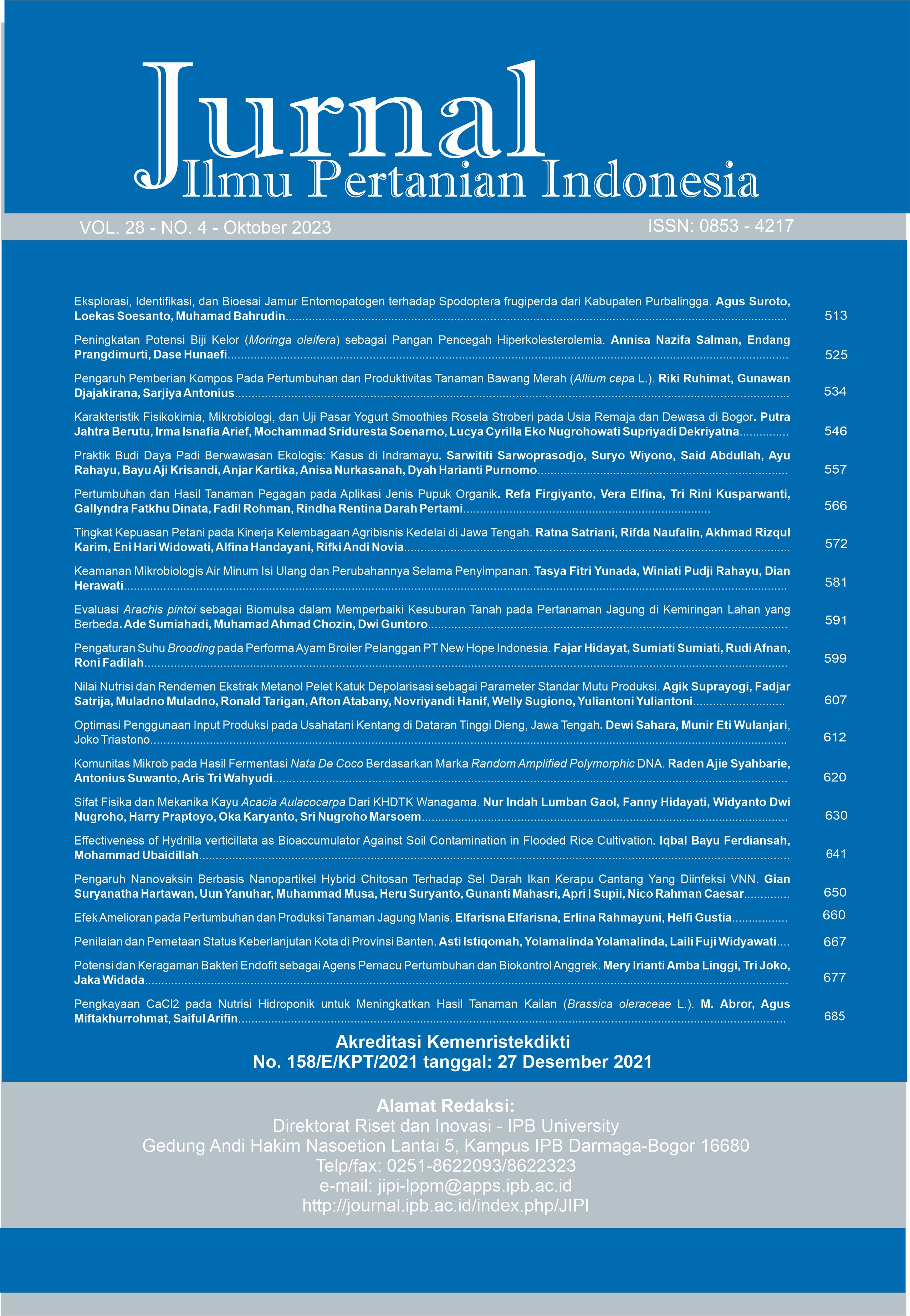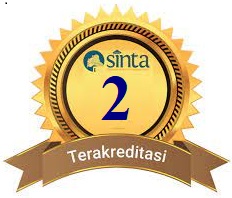Efektivitas Bioakumulator Tanaman Hydrilla verticillatapadaCemaran Tanah pada Budi Daya Padi Genangan
Abstract
Soil pollution can occur due to agricultural waste, one of which is the excessive use of pesticides. Contaminants that are often found are heavy metal of copper (Cu). Rice plants will absorb and store heavy metal elements in polluted soil and waters, and these heavy metals will undergo a process of bioaccumulation in plants that affect plant growth. Efforts to deal with heavy metal contaminants have been carried out. In its application, plants such as hydrilla plant (Hydrilla verticillata) can be used to reduce pollution in the environment. This study aims to determine the effectiveness of using hydrilla plants in reducing heavy metal pollutant copper in flooded rice cultivation. This research was conducted from May-November 2022 at the Agrotechnology Greenhouse, and for laboratory testing it was carried out at the CDAST Laboratory, University of Jember. This research was conducted using a completely randomized design consisting of one factor with four replications. Giving hydrilla did not significantly affect the morphology of rice plants but had a significant effect on the increasing levels of chlorophyll. The concentration of copper in rice plants decreased after treatment with hydrilla plants compared to negative controls without hydrilla plants. In this study, it can be concluded that the use of hydrilla was able to reduce the levels of copper metal present in rice plants and did not affect the growth of rice plants morphologically.
Keywords: copper, hydrilla, paddy, soil contamination
Downloads
References
Afrinda R. 2018. Pengaruh Umur Pindah Tanam Bibit terhadap Pertumbuhan dan Hasil Dua Varietas Padi di Lahan Salin Pantai Baros, Yogyakarta. [Disertasi]. Yogyakarta (ID): Universitas Gadjah Mada.
Aqli HMR. 2019. Fitoremediasi oleh tumbuhan hydrilla (Hydrilla verticillata (LF) Royle) Danau Ranu Grati Pasuruan dengan variasi konsentrasi logam tembaga (Cu). [Disertasi]. Malang (ID): Universitas Islam Negeri Maulana Malik Ibrahim).
Cahyani N, Batu DTFL, Sulistiono. 2016. Kandungan logam berat Pb, Hg, Cd, dan Cu pada daging ikan rejung (Sillago sihama) di estuari sungai Donan, Cilacap, Jawa Tengah. Jurnal Pengolahan Hasil Perikanan Indonesia 19(3): 267‒276. https://doi.org/10.17844/jphpi.v19i3.14533
Cobbett C, Goldsbrough P. 2002. Phytochelatins and metallothioneins: roles in heavy metal detoxification and homeostasis. Annual Review of Plant Biology. 53(1): 159‒182. https://doi.org/10.1146/annurev.arplant.53.100301.135154
Enyoh CE, Verla AW, Egejuru NJ. 2018. pH variations and chemometric assessment of borehole water in Orji, Owerri Imo State, Nigeria. International Journal of Environmental and Analytical Chemistry 5. 1–9.
Hidayatullah A. 2021. Pengaruh Limbah Rumah Tangga Dan Natrium Terhadap Pertumbuhan Hydrilla verticillata. [Disertasi]. Riau (ID): Universitas Islam Riau.
Khairuddin K, Yamin M, Kusmiyati K. 2021. Analisis Kandungan Logam Berat Tembaga (Cu) pada Bandeng (Chanos chanos forsk) yang Berasal dari Kampung Melayu Kota Bima. Jurnal Pijar MIPA. 16(1): 97‒102. https://doi.org/10.29303/jpm.v16i1.2257
Laoli BMS. 2021. Akumulasi Pencemar Kromium (Cr) Pada Tanaman Padi di Sepanjang Kawasan Aliran Sungai Opak, Kabupaten Bantul. Biospecies. 14: 59–66.
Lichtenthaler HK. 1987. Chlorolshylls And Carotenoids: Pigments Of Photosynthetic Biomembranes. Methods In Enzymology. 148. https://doi.org/10.1016/0076-6879(87)48036-1
Rauf AW, Sihombing SR. 2000. Peranan Pupuk NPK pada Tanaman Padi. Departemen Pertanian Badan Penelitian Dan Pengembangan Pertanian. Irian Jaya (ID): Loka Pengkajian Teknologi Pertanian Koya Barat Irian Jaya.
Rompegading AB, Muhlis NF, Arfadilla R, Sari NI, Muliana A, Rahmawati R, Irfandi R. 2021. Deteksi Awal Kandungan Logam Tembaga (Cu) pada Tanaman Kangkung Darat (Ipomoea reptans). BIOEDUSAINS: Jurnal Pendidikan Biologi dan Sains. 4(2): 246‒250. https://doi.org/10.31539/bioedusains.v4i2.2790
Rondonuwu SB. 2014. Fitoremediasi limbah merkuri menggunakan tanaman dan sistem reaktor. Jurnal Ilmiah Sains. 14(1): 52‒59. https://doi.org/10.35799/jis.14.1.2014.4951
Rosihan A, Husaini H. 2017. Logam Berat Sekitar Manusia. Banjarmasin (ID): Lambung Mangkurat University Press.
Shankar T, Malik GC, Banerjee M, Dutta S, Praharaj S, Lalichetti S, Hossain A. 2022. Prediction of the Effect of Nutrients on Plant Parameters of Rice by Artificial Neural Network. Agronomy. 12(9): 2123. https://doi.org/10.3390/agronomy12092123
Xue PY, Li GX, Liu WJ, Yan CZ. 2010. Copper uptake and translocation in a submerged aquatic plant Hydrilla verticillata (L.f.) Royle. Chemosphere. 81(9): 1098–1103. https://doi.org/10.1016/j.chemosphere.2010.09.023
This journal is published under the terms of the Creative Commons Attribution-NonCommercial 4.0 International License. Authors who publish with this journal agree to the following terms: Authors retain copyright and grant the journal right of first publication with the work simultaneously licensed under a Creative Commons Attribution-NonCommercial 4.0 International License. Attribution — You must give appropriate credit, provide a link to the license, and indicate if changes were made. You may do so in any reasonable manner, but not in any way that suggests the licensor endorses you or your use. NonCommercial — You may not use the material for commercial purposes.























